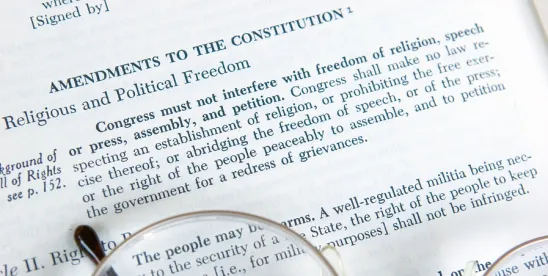In 1988, the Supreme Court drew a bright line: psychological pressure alone cannot constitute involuntary servitude. In 2025, federal prosecutors in Brooklyn obliterated that line, transforming the anti-trafficking statute into a weapon against religious teaching itself. The journey from United States v. Kozminski to United States v. Cherwitz reveals how statutory mission creep became a constitutional catastrophe.
The Kozminski Baseline
The Supreme Court's decision in United States v. Kozminski, 487 U.S. 931 (1988), should have settled the matter. Two mentally disabled men worked on a dairy farm under terrible conditions where the employers controlled their Social Security benefits, restricted movement, and subjected them to squalor. A jury convicted the employers of involuntary servitude. The en banc Sixth Circuit overturned the convictions and sent the case back to the trial judge. The Supreme Court agreed to hear the case and upheld the Sixth Circuit, ruling that even extreme psychological pressure is not involuntary servitude unless it is coupled with physical force or legal coercion. Justice O'Connor's majority opinion wasn't subtle about the dangers of expansion: psychological coercion would criminalize "a broad range of day-to-day activity" and would "delegate to prosecutors and juries the inherently legislative task of determining what type of coercive activities are so morally reprehensible that they should be punished as crimes." The Court worried that an expanded definition would "subject individuals to the risk of arbitrary or discriminatory prosecution and conviction."
The Court's concern proved prophetic. What they feared in 1988 became manifest in a Brooklyn courtroom in 2025.
Congress Makes an End-Run
Congress chafed at Kozminski's limitations in drafting the 2000 Trafficking Victims Protection Act (TVPA), which emerged amid public concerns regarding international sex trafficking. Congress sought to expand prosecutors' reach beyond Kozminski's physical or legal coercion requirement to address scenarios of sophisticated transnational trafficking. Political imperatives took precedence over constitutional permissibility.
Congress split the TVPA into sex (§ 1591) and labor (§ 1589) prongs, invoking as authority the slavery ending Thirteenth Amendment, which Kozminski had just narrowed. The legislative workaround to the ruling was a new legal concept: "serious harm." 18 U.S.C. § 1589 defined forced labor as "any scheme, plan, or pattern intended to cause the person to believe that, if the person did not perform such labor or services, that person or another person would suffer serious harm." Congress kept the definition vague, allowing "serious harm" to include "psychological, financial, or reputational harm."
The net effect was constitutional defiance, enabling prosecutorial expansion. The Supreme Court rejected the exact approach taken in the Cherwitz prosecution as unconstitutionally vague and inviting of abuse. Legal scholar James Lawrence warned pre-trial that this theory "can be readily repackaged and deployed against churches, religious institutions, or other designated enemies of the moment."
The Cherwitz Weaponization
In 2008, Congress added conspiracy provisions to the TVPA to reach trafficking networks, creating an unintended vulnerability: conspiracy charges without substantive crimes. EDNY prosecutors weaponized this loophole with surgical precision. Fresh off convicting Douglass Mackey for conspiracy to post memes in March 2023, they indicted OneTaste executives Nicole Daedone and Rachel Cherwitz in April 2023 on a single count of forced labor conspiracy. No substantive crimes, no named victims, just the conspiracy itself. It marked the first federal trafficking prosecution built entirely on conspiracy without underlying charges. The alleged targets of the conspiracy were adult women who voluntarily joined OneTaste to learn orgasmic meditation and consciousness practices. The Cherwitz prosecution mirrored Mackey in using a novel single-count conspiracy against rights.
The government's theory of the case stretched "serious harm" beyond recognition. Teaching philosophy became coercion. Community dedication became exploitation. Women who spent years praising OneTaste's impact on their lives were transformed into regretful victims who hadn't realized their exploitation at the time.
This transformation may not have been entirely organic. Defense lawyers revealed that each of the nine complaining witnesses at trial underwent a dozen or more government interviews: extraordinary for fact witnesses, as seasoned observers noted. On cross-examination, these witnesses repeatedly departed from their direct testimony, acknowledging their participation had been voluntary and beneficial. The voluminous government interviews suggested alignment of disparate experiences into a unified narrative of victimhood.
The defense invoked Kozminski directly in their December 2024 motion to dismiss (ECF 222), arguing Congress cannot overrule a Supreme Court constitutional ruling. The government's response (ECF 230) essentially claimed Congress wanted to expand beyond Kozminski; therefore, the expansion was valid. Judge Gujarati denied from the bench: “third bite at the apple.” When defense renewed via Rule 29(c) post-trial (ECF 417), the court's August 2025 denial dismissed their arguments as “no more persuasive now.”
The government argued that teachings themselves constituted the means of obtaining forced labor. Prosecutors told the jury: “She is on trial because she... used aspects of her teachings to force OneTaste employees to provide labor.” The alleged serious harm was the complaining witness's assertions that they might be “spiritually ruined” for straying from OneTaste teachings. When the defense raised First Amendment concerns in their Rule 29(c) motion, prosecutors dismissed it as “a naked attempt to launder the trial record... paint a false picture of religious persecution,” language suggesting the prosecution team's vulnerability.
The evidentiary foundation proved equally troubling. Key evidence included journals created for Netflix in 2022, which were presented as 2015 documents until they were withdrawn weeks before the trial. The FBI agent leading the investigation had participated in a "true crime" Netflix film on OneTaste while shaping the case. The defense alleged in over twenty-five motions that the same agent, Elliot McGinnis, had instructed witnesses to delete potential Brady material, hid stolen attorney-client privileged documents while using them as a roadmap, pressurized women to declare victim status against their will, mishandled a hard drive from the government's withdrawn star witness, and made false statements in securing a seizure warrant. The government declined to have McGinnis appear at trial, and the court denied repeated motions for evidentiary hearings regarding misconduct.
Despite these evidentiary disasters, on June 9, 2025, a jury convicted both defendants of forced labor conspiracy. EDNY's single-count conspiracy model—pioneered in Mackey—eliminated traditional prosecutorial burdens. Without proving discrete acts, naming specific victims, or showing actual harm, prosecutors secured convictions through emotional testimony and repeated moral condemnation.
Constitutional Wreckage
The Cherwitz verdict opens what James Lawrence calls "Pandora's box." Prosecutors conceded every alleged victim freely left OneTaste, yet maintained Daedone and Cherwitz weaponized teachings to compel labor, without any limiting principle. This is exactly what Kozminski warned against: exposing defendants to "arbitrary or discriminatory prosecution" while granting "open-ended authority to prosecutors and juries" to decide what pressure is "intolerable."
The First Amendment implications are stark. Defense attorneys argued the government used “Defendants' spiritual beliefs, and their acts of teaching them to other consenting adults, as evidence of a criminal agreement.” The Due Process Clause requires fair notice of criminal conduct. How could OneTaste's founders and executives know that teaching meditation and spiritual philosophy would someday be prosecuted as a labor trafficking conspiracy?
The Thirteenth Amendment, enacted to end slavery, now criminalizes voluntary participation in spiritual communities. The government successfully argued that educated women who chose intensive practice were actually enslaved, their recurring consent irrelevant because they were “brainwashed.” Their advanced degrees and economic privilege became government evidence of psychological control on the part of the defendants.
The Road Ahead
Lawrence's pre-trial prophecy has been fulfilled: “Evangelization becomes recruitment. Labor is extracted through church ministries. Holding others accountable for sin and instructing the faithful to avoid temptation is control.” The Second Circuit, fresh from reversing Mackey's meme prosecution, faces another EDNY conspiracy case with similar First Amendment stakes. The court must decide whether to close Pandora's box or let it spill across American religious life.
Post-Cherwitz, mainstream faith communities face unprecedented criminal and civil liability. Former members can now sue under the TVPA's civil provisions, which require lower evidentiary burdens while offering damages plus attorneys' fees. Every disgruntled ex-Mormon missionary, former seminarian, or departed ashram resident potentially holds a contingency fee lottery ticket. As Lawrence warns, “What prevents prosecutors from charging conduct within these relationships as federal crimes?” Nothing, and nothing stops plaintiff's lawyers from targeting billion-dollar religious endowments either.
United States v. Cherwitz is a defining moment: on appeal, the Second Circuit will either restore constitutional boundaries or bless their destruction. The court will decide whether the First Amendment still protects spiritual teaching or whether we've entered an era where regret equals retroactive enslavement.
The distance from Kozminski to Cherwitz measures not just legal evolution but constitutional decay. What the Supreme Court forbade, Congress circumvented. What Congress enabled, prosecutors weaponized. What began as protection for trafficking victims ended as persecution of meditation teachers.
Welcome to the post-Cherwitz world, where your teachings today might be tomorrow's trafficking conspiracy.
All of the views and opinions expressed in this article are those of the author and not necessarily those of The National Law Review.




 />i
/>i

